Random comments from 1965 Peace Corps Conference (Washington, D.C.)
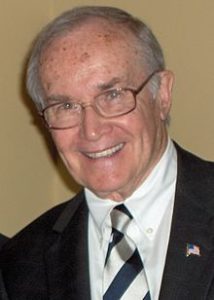
Newton Minor
“One businessman conducted a market survey among the returned Volunteers to find out if it was really true that Peace Corps members preferred beer to whiskey. His conclusion is that this is a misguided myth of the past.”
Newton Minnow
Former Director of the Federal Communications Commission.
•
“My definition of a coward is a Volunteer who returns from work overseas and then goes to work for Peace Corps, Washington.”
Dick Irish (Philippines 1962-64)
Dick worked at the Peace Corps in the Office of Volunteers Support.
•
“I was one of those white Southerners that had to go out of the country to really become enlightened on the problems of race in the South and so I feel that it is my obligation to go back to the South and do something about it.”
Don Boucher (Chile 1962-64)
•
“A special participant said he was pleased with the showing of former Volunteers on his staff ‘not for what they know, but because of what they are willing to do–hard, intellectual study on the one hand and dirty, practical work on the other.'”
Glen Leet
Community Development Foundation
•
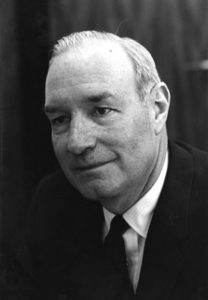
Harlan Cleveland
“We talked a good deal about foreign policy and the management of international affairs. The Peace Corps Volunteers, by and large, thought that the best part of American foreign policy was, curiously enough, the Peace Corps. Indeed they criticized almost every other element of American foreign policy and its agents abroad, particularly the embassies, as being aloof. Then after the first shock had worn off, some of the other people in the room asked whether the Peace Corps Volunteers themselves weren’t pretty aloof, and on that, I think, it was a draw.”
Harlan Cleveland
Assistant Secretary of State for International Organization Affairs
•
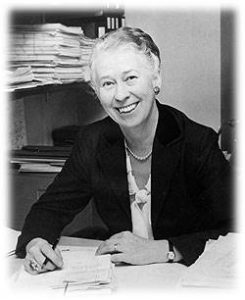
Esther Peterson
“The burden of finding a place in society rests primarily on the Volunteer himself. Volunteers tell me of difficulty in communicating the essence of their experience when they return home. They seem often to find problems in making the transition, in re-establishing relationships with Americans and with America. Thus, they sometimes seek companionship among other Peace Corps returnees. But if friendship s are limited in this way, the danger arises that the only other Americans who will benefit from the Peace Corps experience are members of the Volunteer’s family who may listen in at home gatherings. The entire community will gain only if the Volunteer is willing to apply this experience wherever he is — the backyard, the settlement house, on Madison Avenue. The young Peace Corps returnee un-established in a career may upon return feel a bit reluctant to enter fields not directly related to social service. Shouldn’t he be reminded that there is no place, no job, no position where the Peace Corps spirit is not needed?”
Esther Peterson
Assistant Secretary of Labor, in a statement to the conference.
[Mrs. Peterson’s son, Eric, served as a PCV in the Philippines 1961-63.]
•
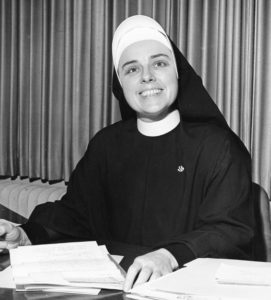
Sister Jacqueline Grennan
“I may have been chosen to deliver the report because I am the only one here at the Peace Corps Conference that carries a vestige of a foreign costume.”
Sister Jacqueline Brennan
President, Webster College
•
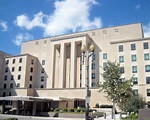
The elite establishment is aloof to the desires of the people around the world today; back then it was merely the Third World.
Back in 1963 fewer than 10% of Americans had college degrees and those in positions of power were the elites of the elite. So when they claimed “Maybe the PCVs are aloof?” what they probably meant was “PCVs are aloof to the dangers and pressures of controlling the whole world economy to stop the spread of communism.”
There is a good lesson in this for everyone. I believe many (if not most) powerful leaders are aloof to the struggles and desires of the people. However, it doesn’t have to be this way. We do not have to live in a dangerous world of fear. Our leaders could follow Confucius’ example to serve the people and not the other way around.
And most importantly, in the 21st century one thing should be clear: Homo sapiens are one species. We can and must find a way to unite our species in order to wrest the $2-4 trillion wasted on wars annually to enlist our best and brightest and all of our resources in our species’ greatest test yet: find a way to protect the environment from ourselves.
Harlan Cleveland appeared to think Americans were eager to learn about what the Peace Corps Volunteers had done and learned. I don’t think so. When I left for service in 1963, I was hailed as a hometown hero, when I returned in the summer of 1965, I was labeled, with contempt, a hippie. I, of course, was neither. I was advised not to mention my PC experience when I applied to enter a graduate program in Anthropology. Which I did. Only after acceptance, did I reveal my “past.”
When Bob Klein (Ghana () began his great RPCV oral history project, he said when we tried to talk about our experiences to non-RPCVs, eyes rolled, and ears closed down. We seek out each other because no one else really cares that much.
This is why I think the Museum of the Peace Corps Experience is so critically important. Americans would be free to explore on their own what the Third World looks like through the PC looking glass. I think that kids would be especially interested in learning about their counterparts in the rest of the world. I think it might well help refugee children feel more welcome in our country. I also wish that universities would offer a section of Peace Corps Writers in American Lit and American Studies courses.
When I see the people of Ethiopia where I served as a PC volunteer for two years, I always have a enjoyable reunion with their language! I am not sure we can’t talk about our experiences to other non-volunteer!
Anne,
I hope so much you are right. I am just speaking of my experience so many years ago.